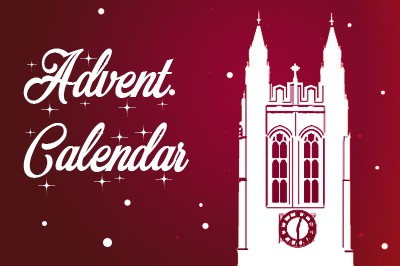It has been said that three figures stand at the heart of Advent: the Prophet Isaiah, John the Baptist, and the Blessed Mother. At the beginning of Advent (and throughout the season), we hear of Isaiah’s vision of the child to be born of the Virgin, the “Prince of Peace” (Isaiah 9.5–6). Last week, on Gaudete Sunday, we turned to John the Baptist, the link between the prophets of the old order and the apostles of the new. This Sunday we look to Mary, who is at the very heart of the Advent season and what it means for our expectation of “Emmanuel,” God with us.
The bond between Mary and Jesus is stressed not only in the Gospels, especially in the passage from St. Luke that we hear today, but also in the history of Christian teaching. Mary was officially designated the “Mother of God” or Theotókos around the time of the Third Ecumenical Council, at Ephesus in 431, primarily because she demands that honor if we are to appreciate what it means for Jesus Christ to be truly human and truly divine. We look to Mary and acknowledge that the confounding exchange between God’s greatness and human need that came to pass in a young, poor, unmarried woman.
The Church highlights this mystery by carefully selecting today’s reading and prayers. The first reading, from the second Book of Samuel, points to the origins of the Temple of Jerusalem, which is identified with King David’s request for a house in which the Lord could dwell. Here Nathan the prophet announces to David that his Temple will not be built on David’s terms, but brought up from David’s own line. Yes, there will be a Temple, but there will be more: God will also raise up a “bodily” Temple, a Messiah, from among David’s heirs.
Ancient readers made explicit links between Mary and that Temple. An old legend linked the young Mary to service at the Temple (a connection we celebrate with the Feast of the Presentation of Mary). They found parallels in the way in which God chose to dwell with Israel in the worship at the Temple and the way that God came to be one with us in the Blessed Mother.
Yet, unlike the Temple of Jerusalem, Mary is not simply an empty vessel to be filled: she participates in God’s presence among us. With her yes, her Fiat, Mary offers to God the human flesh and the human soul he needs to come into our world. Without Mary, no Jesus.
Recently an even deeper link between God and Mary occurred to me when I was reading about contemporary research into the enduring links between mother and child. We all understand that mothers are bound to their children in love and affection and history. We all know that mothers sustain the life of their children from the very moment of conception. Yet scientists are discovering more and more that the relationship is not just one way: the mother does not simply transmit nourishment and material to her child, but rather the child comes to influence and affect the mother, even bodily. This influence isn’t just because a mother’s body develops in response to the growing child, but because the very identity of the child, its DNA, becomes a part of the mother’s makeup. As one article puts it, mothers “carry at least three unique cell populations in their bodies—their own, their mother’s, and their child’s.” Children literally become parts of their mothers, passing on just some of who they are even as they move on to live independent and autonomous lives.
What does this mean for Mary? Well, on a biological level, Mary’s yes would mean that she would carry Jesus not only for nine months, but for the rest of her life. And if we confess that Jesus is truly divine and truly human, that who he is as God is inseparable from who he is as one of us, we would see that Mary is also somehow divine in precisely the same way.
This link also reminds us all of our bodily links one to another. We carry not only memories and insights from our parents and our cultures, but even their very flesh and blood. We are not isolated or alone. And our bodily union gives even deeper meaning to our union as the Body of Christ. As we gather to celebrate the Eucharist, we do well to remember the words of St. Augustine:
“If you, therefore, are Christ’s body and members, it is your own mystery that is placed on the Lord’s table! It is your own mystery that you are receiving! You are saying ‘Amen’ to what you are: your response is a personal signature, affirming your faith. When you hear ‘The body of Christ,’ you reply ‘Amen.’ Be a member of Christ’s body, then, so that your ‘Amen’ may ring true!”
Boston College C21 Advent Calendar
The Church in the 21st Century Center is celebrating Advent with an exciting, interactive calendar. A different surprise will be unlocked each day of the season, so bookmark the page, and visit daily as we count down to Christmas.



